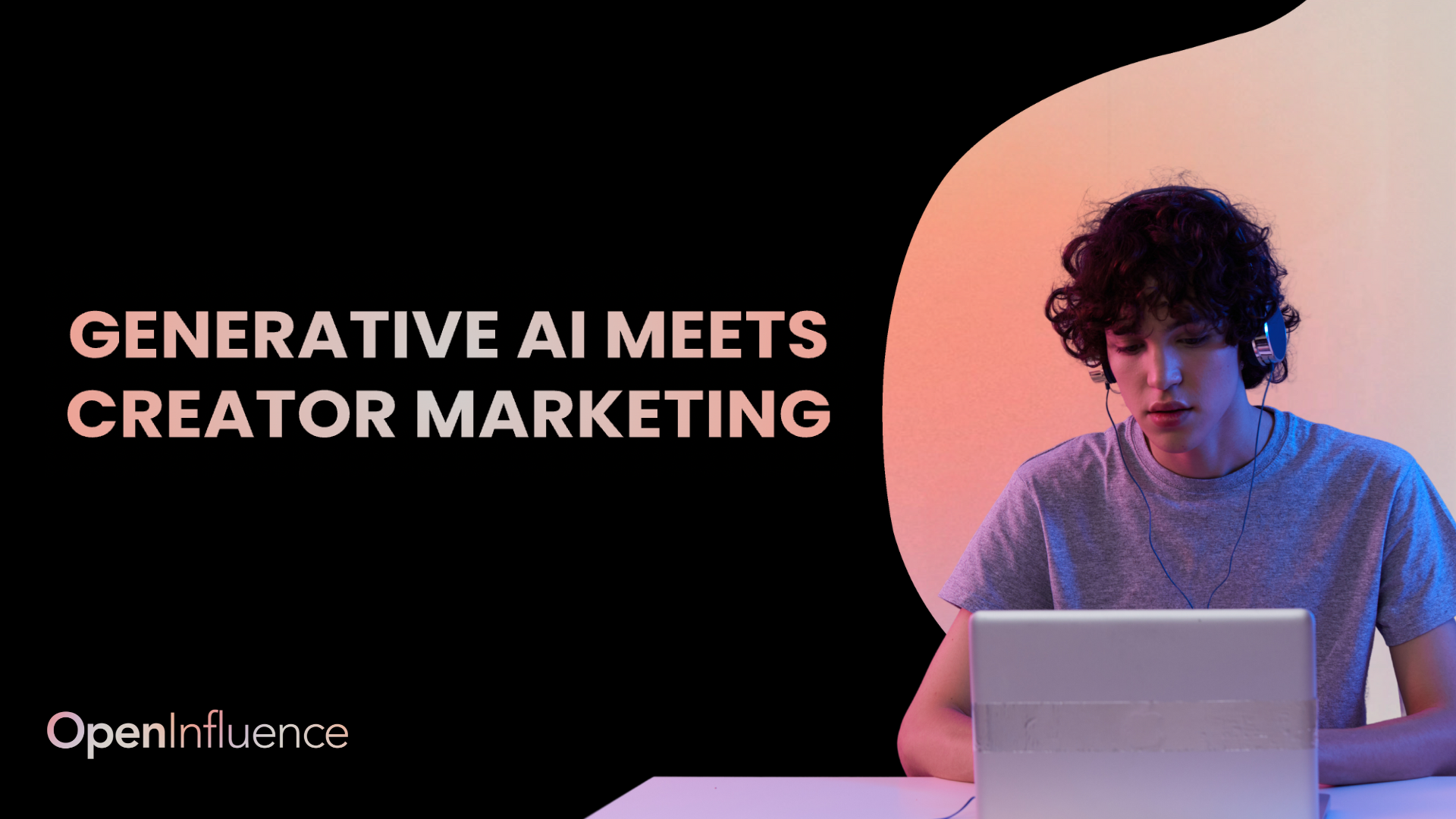AI and the Creator Economy
AI is trending immensely now because of the development of generative AI and the mass exploration of all its capabilities. Generative AI goes beyond what traditional AI’s capabilities encompass such as analyzing data and assisting with predictions, genAI creates entirely new content based on learnings from large datasets.
People everywhere, not just businesses, are exploring what genAI has to offer from holding conversations with chatbots and conducting research using them, and even creating art, videos, and new music. People are now able to create entirely new images and videos in a matter of minutes or hours which in the past may have taken a few days.
We are not only seeing a boom of AI within media and people’s curiosities. According to Statista, the current market value of AI in marketing worldwide is $27.37 billion, and it is expected to increase to $107.54 billion in 2028. And we are already seeing it become widely used within the creator marketing industry, causing an array of doubt, excitement, and innovation among brands and creators.
Talks have evolved beyond “how will AI affect the creator economy?” to “how will AI continue to change the industry?” Since the early days of artificial intelligence, traditional AI helped to facilitate brand-creator partnerships, and it still is. AI tools help expedite this process, helping brands select the right creators for their campaigns by quickly identifying a creator’s interests, audience demographics, engagement levels, brand safety levels, and other key insights.
Now one of the most prominent ways recent genAI advancements affect the creator economy is that it expedites content creation processes. Using genAI software such as ChatGPT or Midjourney, marketers and creators alike are able to develop ideas, accelerate writing processes, and edit all forms of media at a faster pace, allowing for an increased amount of content to be created.
According to Hubspot, the integration of AI tools allows marketers to cut five hours of menial work per day to 2.5 hours. Of the 62% of business leaders surveyed by Hubspot who have already invested in AI tools, 72% say those tools help their employees’ productivity.
Brand Marketers and AI
Before AI, marketers had to conduct creator content analyses that involved manually placing creators in category silos, requiring a tedious search through creators, tags, posts, and so on. However since 2017, companies, like Open Influence, created and began using proprietary AI tech that allowed them to eliminate the need for this type of manual work. The AI offered marketers at OI invaluable data that could determine how content resonates with different communities and help them better align their own organic content with audiences they wanted to resonate with.
Currently, along with the traditional analyzing data and reports, marketers can use new genAI to quicken more types of workflows including creating content, learning new processes, and conducting research. The top types of genAI tools used are chatbots, text generation tools, image editing and generation tools, and audio tools. Now, writing blogs, emails, social media captions, and forming an array of new creative ideas for pitches and more can be done much more efficiently.
A total of 82% of marketers say AI has already impacted their content creation plans for 2023, and 35% are using it to create SEO-driven strategies. In fact, Hubspot reported that 71% of businesses that are using AI tools saw a positive return on investment.
How can brand marketers ensure that they’re not falling behind in the wake of genAI advancements? Don’t run from them, because as we learned in the past, it will only enhance workflows. While some marketers may have doubts about implementing genAI into their workflow, this can cause them to fall behind the competition.
Social Platforms and AI
AI is also beginning to bleed into social media with features like Snapchat’s My AI and TikTok’s testing of an AI chatbot called Tako. Other social platforms like Facebook, Instagram, and Discord are also reportedly working on genAI chatbots. These chatbots have the potential to alter social search behaviors further and continue moving people away from using search engines like Google for exploration and research purposes.
The shift from consumers using search engines to genAI in social platforms for research purposes opens the door for a new space for ads through sponsored links—something Snapchat is ahead of the game in and already testing in their MyAI chatbot. As more platforms follow in these footsteps, they can use their AI features as a valuable source of first-party data for their ad businesses and boost overall commerce within the platforms.
Creators and AI
The way genAI tools apply to brand marketers is in many ways the same for creators. Creators can also use genAI tools to save time during caption and email generation, but more importantly, creators can use AI to generate new creative concepts and build on their original ideas.
Creator and artist Sara Shakeel, who has 1 million followers on Instagram, detailed how she used genAI to take her personal art style to a new level:
View this post on Instagram
According to Business Insider, 94% of creators said they are using genAI to assist them in editing content and generating images. During Open Influence’s Open Creators 2023 event, creators shared their thoughts regarding AI, and while some shared doubts, most showed interest in experimenting with it in one way or another.
Spence (@spence) a content creator and music producer with 1.3 million followers on Instagram, said, “I’m really excited about AI. I think if you don’t start implementing in some way, you’re possibly going to be left behind. I haven’t used it for anything I’ve put out to the world, but I’ve tested it, and I’ve written some comedy skits with it before, and it’s actually getting funnier and funnier, which is kind of scary and also kind of exciting. The skits started dull, and within a week I started laughing at them.”
Ivan McCombs, (@ramenkingivan) a creator with 10.2 million followers on TikTok, said, “I think it’s something we should definitely look into. I haven’t used it to create content because I don’t think AI can replicate human emotion. I use it for emails, though: t’s like my personal assistant.”
AI Worries and Solutions
In a survey conducted by Influencer Marketing Hub, 71% of people felt that AI can outperform humans at their jobs. A common fear that surfaces when discussions of AI arise is that AI will begin to replace humans at their jobs in the future. Others fear that AI will cause a decrease in creativity and authenticity within the content created, since many people will rely on the same sources for ideas.
However, AI is reliant on human input and refining. The quality of content and ideas is reflective of the ideas and prompts provided by the human behind the screen. Even as AI technology and quality advance, the information is not ready to go without human inspection or modification. Right now, incorporating AI into workflows allows for efficiency, but eMarketer predicts that it will cause marketers to place a premium on creativity. So creators who have the strongest original ideas and communities and use AI to strengthen them (instead of using solely AI) will be the most successful.
The bottom line is that AI is not human, and creator marketing is built on human-to-human connection!
“[AI] is coming. All we can do is embrace it and educate ourselves about how it works, and be artistic and creative about how we can use it to help us be better at what we do. I’m trying to educate myself so I can use it. If you don’t jump on, you’re going to miss the bus,” said Chadd Smith (@maddchadd) a creator with 418,000 followers on Instagram.
Check out some genAI tools used by marketers and creators:
AI is boosting efficiency and saving marketers and creators time, but nothing beats the human touch. Reach out to Open Influence, an award-winning global influencer agency, to see how you can incorporate AI into your campaigns and lead with authenticity.

